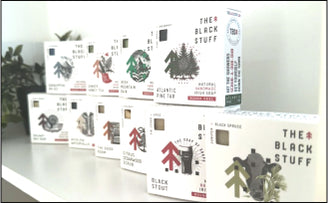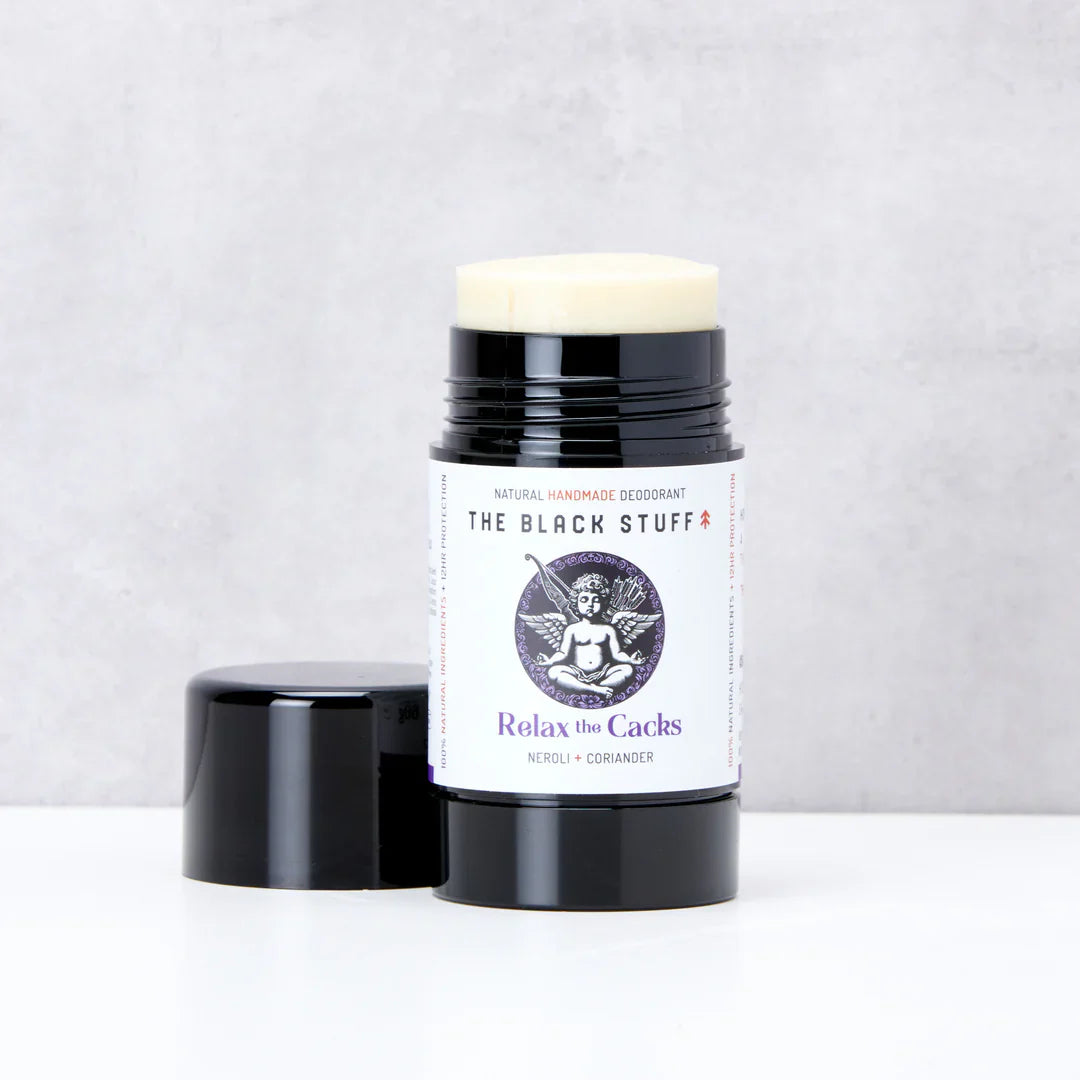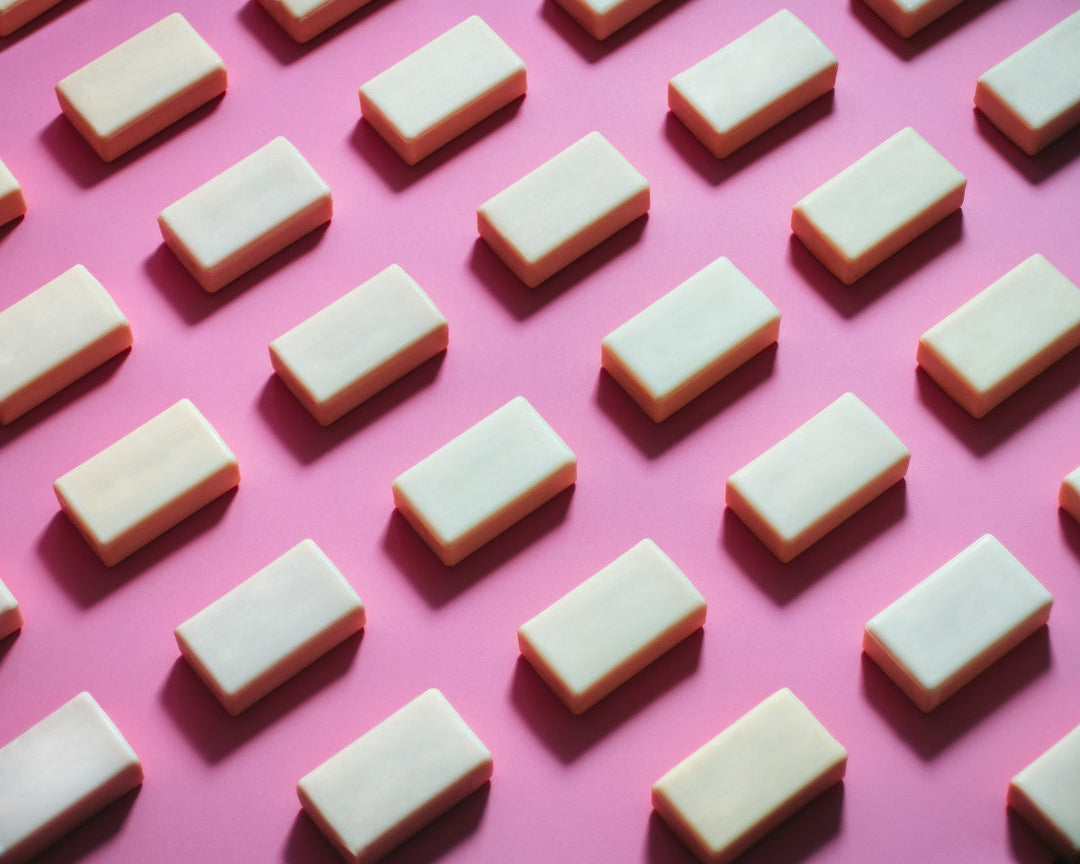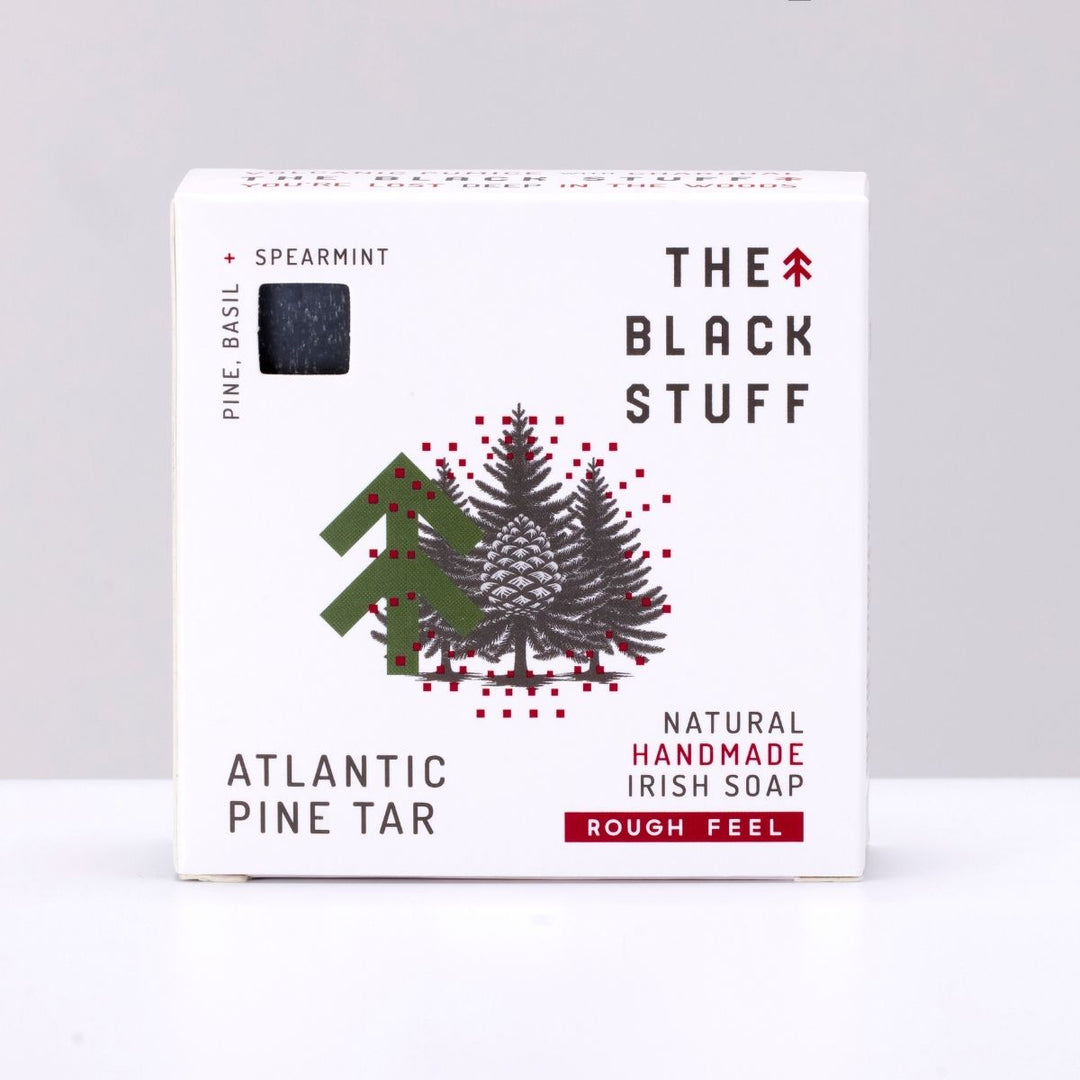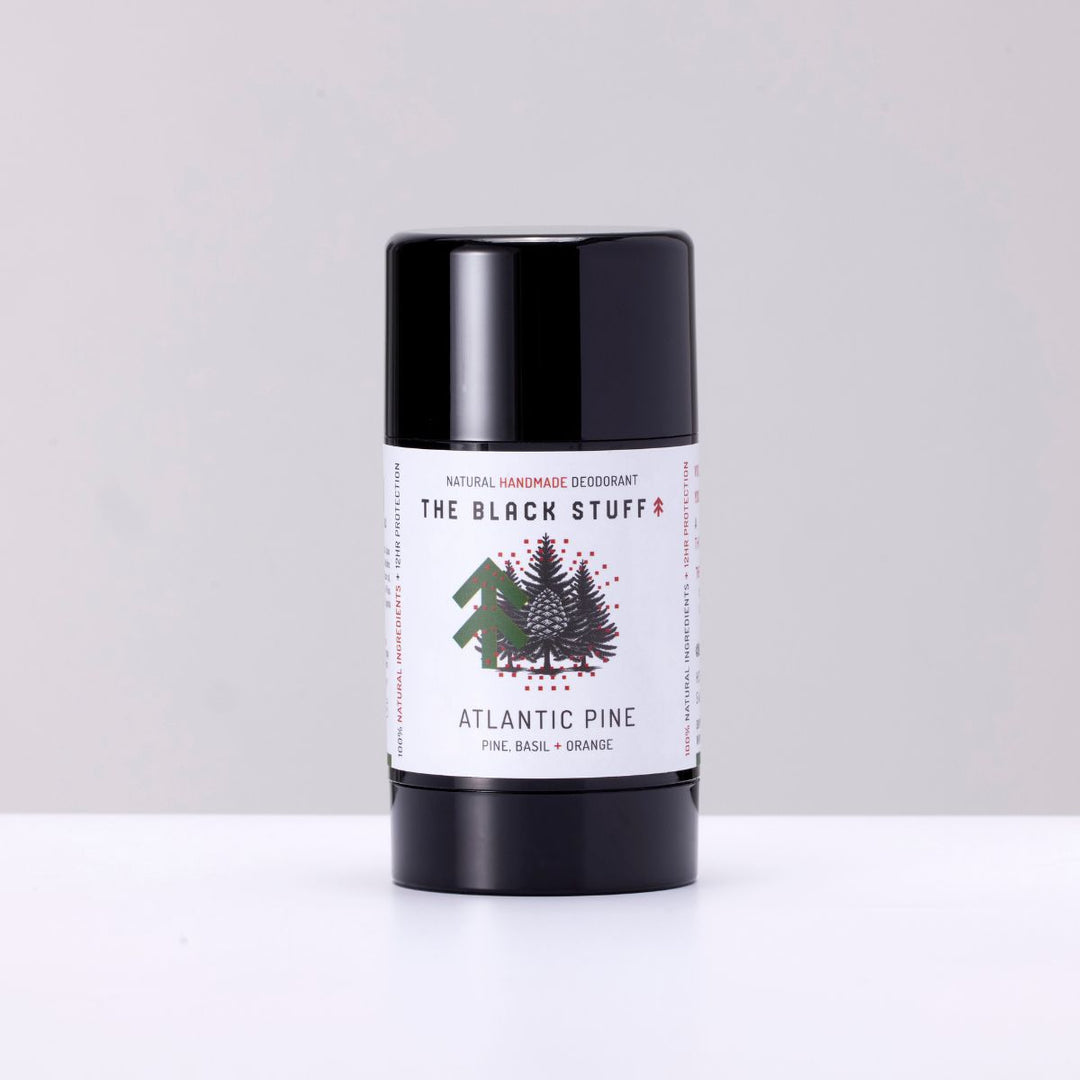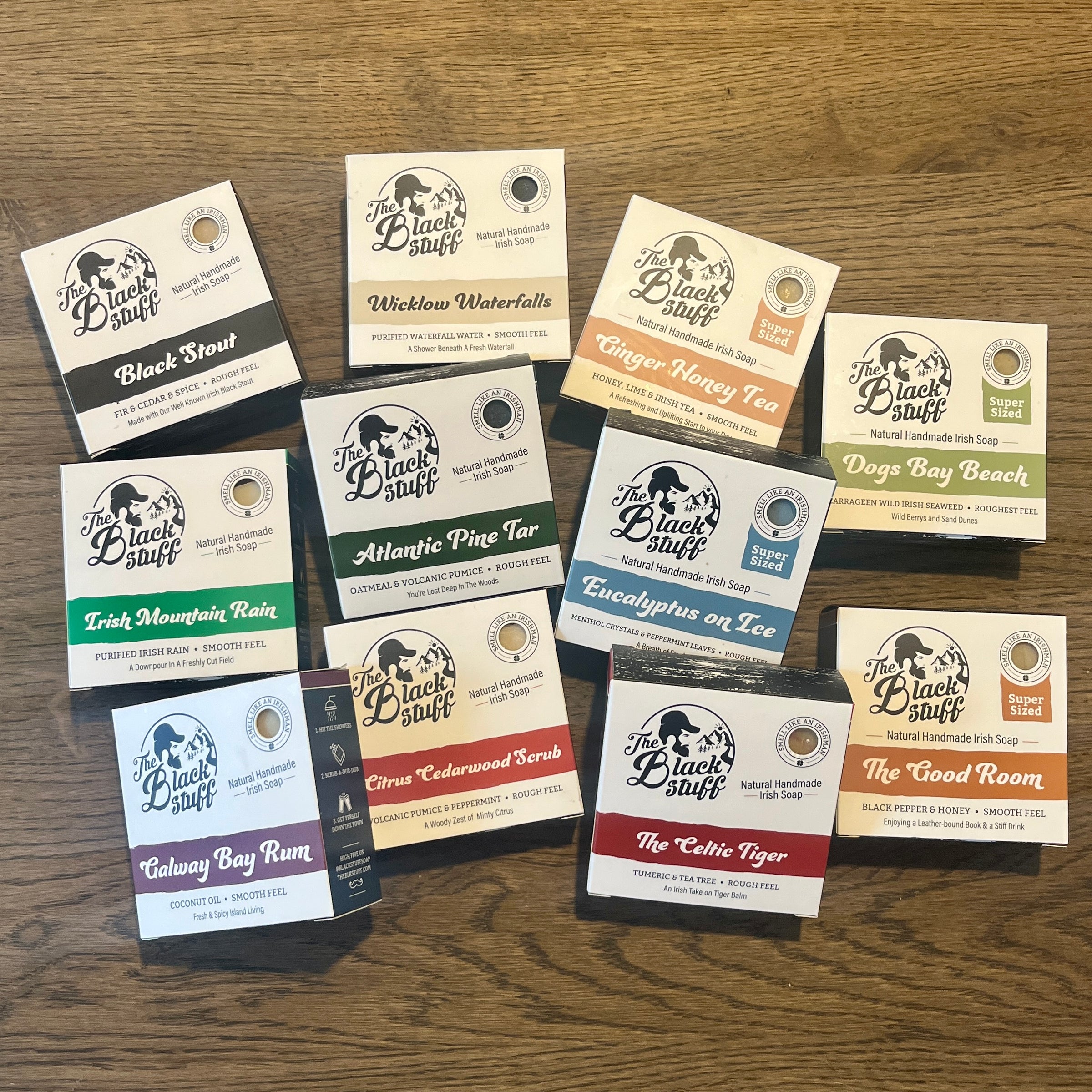What is Natural Soap Made Of? The Most Common Natural Soap Ingredients

You might already know that natural soaps are better for you and the environment, and are considering making the switch. But first, what is natural soap made of? After all, the natural soap ingredients are what lead to all the benefits it has to offer.
The actual natural ingredients for soap will vary from product to product, soapmaker to soapmaker. However, the natural soap base ingredients tend to include these four categories:
- Plant-based oils and butters
- Essential oils
- Natural colorants and exfoliants
- Sodium hydroxide (lye)
Your best bet if you’re interested in seeing exactly what you’re putting on your skin is to read the ingredients label for a specific bar of soap. Any brand worth supporting will proudly display these ingredients for all their different formulations. At least, we do here at The Black Stuff.
Learn more about the common ingredients to make natural soap below, how these ingredients are brought to life, and the benefits you stand to gain by using this as an alternative to shower gel or traditional men's soap. Remember, the best soap for men is only a click away!
What is Natural Soap Made Of?
So, what is natural soap made of? We’ll look at the more specific natural soap ingredients for each of the four most important classes of ingredients to make natural soap below.
Plant-Based Oils and Butters
Olive oil, coconut oil, and shea butter are some of the most common foundations for a natural soap formulation. They go beyond basic cleansing and actually deliver moisturization and other benefits, too.
Olive oil, for example, has been used for centuries to soothe and hydrate skin because it’s loaded with antioxidants. Coconut oil creates that nice lather, while shea butter keeps your skin soft and nourished after you rinse off.
This powerful combination works better than the synthetic stuff in commercial soaps. But, it’s just one piece of the puzzle.
Essential Oils for Scent and Skin Benefits
Ever wonder why natural soap smells so much better? It’s more subtle and natural, holding true to the name. This is because genuine essential oils are extracted from plants and infused into the soap bar rather than synthetic fragrances that can irritate your skin.
Lavender, eucalyptus, and tea tree oil are all common choices, but you’ll also find plenty of more obscure oils here in our catalog because we’re always exploring new scent combinations.
These don’t just smell great, they also have their own unique benefits for your skin. For example, tea tree oil is known for its antibacterial properties, making it perfect for keeping your skin clean and clear. On the other hand, lavender is calming for both your skin and your mood.
Natural Colorants and Exfoliants
While traditional bars of soap tend to be plain white, you’ll notice natural soaps have vibrant colors that make them pop. What is natural soap made of that causes this?
No synthetic dyes here. Instead, the colors you see come from clays, botanicals, and other natural colorants. Common natural ingredients for soap here include activated charcoal or oatmeal.
These don’t just add a natural hue but also serve a practical purpose. Charcoal helps draw out impurities, while oatmeal offers a gentle exfoliation, scrubbing away dead skin without being too harsh.
You may be starting to notice a common theme. The natural soap ingredients are strategically selected for their ability to deliver tangible benefits. This is starkly different from synthetic soap, where ingredients are chosen based on cost alone.
Sodium Hydroxide (Lye)
There’s one more essential ingredient to make natural soap. In fact, you cannot technically have a soap without it. That’s sodium hydroxide, also known as lye.
It’s the key to the saponification process - the reaction between lye and oils that turns them into soap. While historically lye has been associated with safety concerns, there’s actually nothing to worry about. Once the soap is fully cured, there will be no lye left in the soap.
Instead, you just have a pure, powerful bar of soap ready to clean your skin without any harsh residues. But how exactly do all these ingredients come together to form that bar of soap? How is natural soap made? Let’s take a look at two different processes below.
How is Natural Soap Made?
First, it’s important to note that natural soap is made by hand. That is true across different methods. But, there are two different ways to make natural bars of soap - the cold process and the hot process.
The Cold Process Soapmaking Method
Most artisanal soapmakers use the cold process soapmaking method, and for good reason. It’s a slower, more hands-on method that creates a smooth, long-lasting bar.
Oils (like olive, coconut, or shea butter) are mixed with lye at room temperature. This kicks off a chemical reaction called saponification, where the oils and lye come together to form soap.
Cold-process soap takes time to mature. It needs to cure for about 4-6 weeks after it’s poured into molds. This is when the soap hardens, becomes milder, and any remaining lye is completely neutralized.
Cold process soaps tend to be smoother and more polished. They can be designed with intricate swirls and layers, too. If you want a bar of soap that’s as good for your skin as it is to look at, this is the method that makes it happen.
The Hot Process Soapmaking Approach
Maybe you don’t care so much about the frills and just want a bar of soap that does its job well. The hot process is all about speed, but it doesn’t sacrifice cleaning performance or skin health along the way.
This more rugged approach heats the oils and lye to speed up saponification. You can think of it like “cooking” the soap. It gets you to the finish line much faster, sometimes in just a few days rather than the weeks it takes with the cold process.
This is ideal for soapmakers who want to produce a batch quickly or for those who want a more rustic, textured bar. The soap itself looks rougher which some love - it has that old-school look that makes you feel as if it really was made in someone’s home, like generations before us.
The added heat means you can also throw in extras like essential oils or exfoliants later in the process without worrying about them breaking down. So while it may not be quite as pretty, it’s more practical - you can create more batches in less time without compromising on quality.
Benefits of Relying on More Natural Soap Ingredients
With a better understanding of the natural ingredients for soap and what goes into bringing these bars to life, why is all the extra work worth it?
There are quite a few reasons you should seek out products made exclusively from natural soap ingredients. The key takeaway, though, is that natural soap does so much more than just clean. It nourishes, protects, hydrates, and supports the environment along with small business.
Healthier for Your Skin
The natural ingredients to make soap are loaded with vitamins, antioxidants, and nutrients that bring out the best in your skin health.
Commercial soaps strip away your skin’s natural defenses, but natural soap builds them up. It hydrates and soothes so you don’t end up with the dry, tight feeling you get from other soaps.
No Toxic Buildup
You're not rubbing synthetic chemicals into your skin when you choose natural soap, which means no stressing about the buildup of toxic ingredients in your body.
The synthetic ingredients in commercial products can accumulate over time and contribute to potential health risks. Natural soap avoids that problem completely - just clean, simple ingredients that wash away without leaving behind anything harmful.
Kinder to the Environment
It's not just better for your body - it’s better for the planet. Natural soap ingredients are biodegradable and won’t pollute the waterways as they wash down the drain.
Plus, many natural soaps are made using sustainably sourced ingredients, meaning you’re supporting eco-friendly practices with each bar you buy.
Supports Ethical Practices
Most commercial soap companies are all about cutting costs, often at the expense of the environment or ethical sourcing.
Natural soapmakers, on the other hand, are more likely to prioritize fair trade, cruelty-free, and sustainable practices. By choosing natural soap, you're backing businesses that care about doing things the right way - not just the fast or cheap way.
So, if you’re ready to experience the benefits of using natural soap ingredients for yourself and looking for a brand to support, there’s only one thing left to do. Shop at The Black Stuff!
Give Your Skin the Gentle, Nourishing Cleansing it Deserves at The Black Stuff!
Our brand was born when our founder started to make bars of soap by hand in his kitchen. A lot has changed over the years, but we’re still doing things the old-fashioned way and focusing on creating the most gentle, effective natural soap bars available.
You can rest assured you’re getting a soap that goes beyond cleansing - it nourishes, hydrates, and repairs. Plus, it smells great. In fact, your order is backed by our first scent guarantee. If you don’t love it, we’ll work with you to make it right.
So, what is natural soap made of at The Black Stuff? If you want to learn about the specific natural soap ingredients we use, you’re in luck. We’re big on transparency, so we share all the ingredients used across our soaps. See for yourself:
- Pine tar soap: Distilled water, Saponified Oils of (Olive, Coconut, Sustainable RSPO Palm, Castor), Shea Butter, Oatmeal, Volcanic Pumice, Activated Charcoal, Essential Oils of Sweet Orange, Pine, Basil, Lavender, Spearmint, Pine Tar, Kaolin Clay, Sea Salt.
- Cedar citrus soap: Distilled water, Saponified Oils of (Olive, Coconut, Sustainable RSPO Palm, Castor), Shea Butter, Oatmeal, Volcanic Pumice, Essential Oils of Sweet Orange, Cedarwood, Rosemary, Lemon, Peppermint, Kaolin Clay, Sea Salt, Orange Mica.
- Eucalyptus soap bar: Distilled water, Saponified Oils of (Olive, Coconut, Sustainable RSPO Palm, Castor), Shea Butter, Menthol Crystals, Peppermint Leaves, Oatmeal, Volcanic Pumice, Essential Oils of Ylang Ylang, Peppermint, Eucalyptus, Lemon, Kaolin Clay, Sea Salt, Blue Mica.
- Bay rum soap: Distilled water, Saponified Oils of (Olive, Coconut, Sustainable RSPO Palm, Castor), Shea Butter, Sieved Oatmeal, Essential Oils of Cinnamon, Sweet Orange, Clove, Pine, Spearmint, Kaolin Clay, Sea Salt/
- Ginger bar soap: Irish Tea, Saponified Oils of (Olive, Coconut, Sustainable RSPO Palm, Castor), Shea Butter, Honey, Sieved Oatmeal, Essential Oils of Ginger, Black Pepper, Lavender, Clove, Lime, Bergamot, Kaolin Clay, Sea Salt, Green Oxide.
These are just a few of the most popular varieties we have in store for you at The Black Stuff. You can also trust us for the most gentle, effective natural deodorant for men.
So, take a look around and see what catches your eye. Find out firsthand what a difference the natural ingredients for soap can make in your grooming routine!
Parting Thoughts on the Natural Ingredients for Soap
So, what is natural soap made of? We hope this overview of the most common natural soap ingredients has left you with a clear understanding of not just what goes into making these bars, but why they’re so much better for you.
Simply put, you’re giving your skin the nourishment it needs while avoiding the harsh chemicals found in commercial soaps. From better hydration to gentler cleansing and supporting brands that use ethical practices, the benefits of natural soap speak for themselves.
Our blog has more resources on topics like what is ginger soap good for, natural deodorant vs antiperspirant, how to use natural deodorant, and more.
Otherwise, we invite you to see for yourself how the natural ingredients for soap can elevate your grooming routine. Your skin deserves better, and we’re here to deliver. Once you feel the effects you’ll be back for more!
















